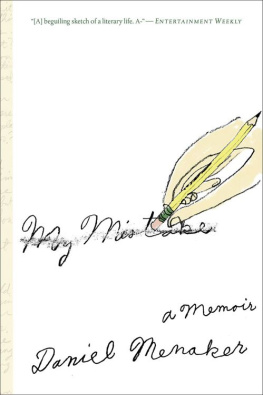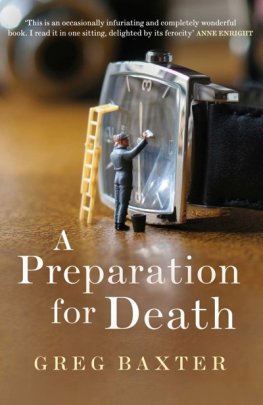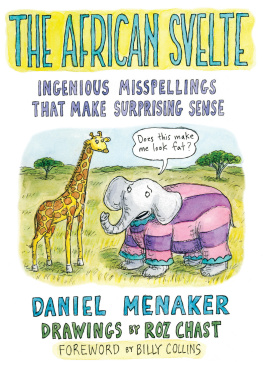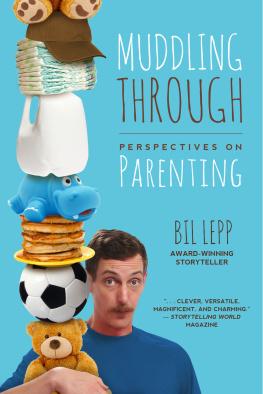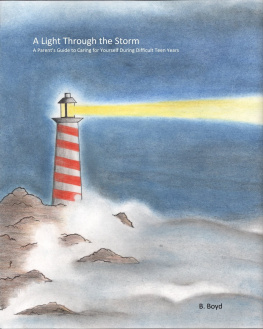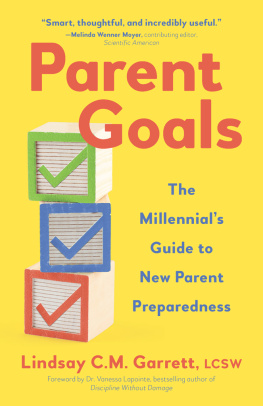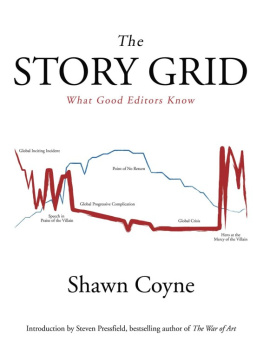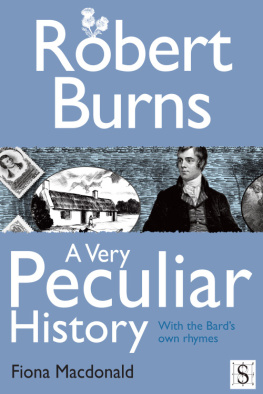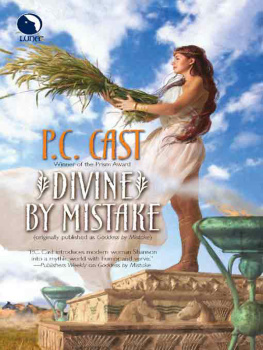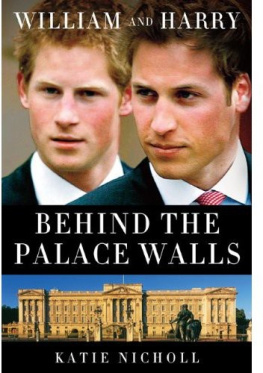
Table of Contents
First Mariner Books edition 2014
Copyright 2013 by Daniel Menaker
All rights reserved
For information about permission to reproduce selections from this book, write to Permissions, Houghton Mifflin Harcourt Publishing Company, 215 Park Avenue South, New York, New York 10003.
www.hmhco.com
The Library of Congress has cataloged the print edition as follows:
Menaker, Daniel.
My mistake / Daniel Menaker.
pages cm
ISBN 978-0-547-79423-5 (hardback) ISBN 978-0-544-33453-3 (paperback)
1. Menaker, Daniel. 2. EditorsUnited StatesBiography. 3. Book editorsUnited StatesBiography. I. Title.
PN149.9.M42A3 2013
070.4'1092dc23
2013019213
e ISBN 978-0-547-79424-2
v2.1014
In significantly different form, portions of this book originally appeared in the New York Times Book Review; the New York Times Week in Review; the anthology Brothers: 26 Stories of Love and Rivalry, published by Jossey-Bass; and the Barnes & Noble Review. The humor piece Certain Questions in the History of the Party originally appeared in The New Yorker.
I am grateful to the following people for permission to quote from unpublished correspondence: Alice Munro (letters), Wallace and Allen Shawn (a note to me from their father, William Shawn), and Ellen Brodkey (a note to me from her husband, Harold Brodkey).
The names of some individuals in this book have been changed, out of respect for their privacy.
In loving memory of
THEAREATHA ROGOWSKI
Introduction
M Y GODFATHER INVESTIGATED my father for the FBI and was involved in a car chase with Baby Face Nelson. My uncle had Frederick Engels for first and middle names. My father went to Mexico and spied on Trotsky for the Communist Party of the United States. My fathers forebears were, according to an Orthodox Jewish camera dealer on West 45th Street, an important clan of Talmudic rabbis descended from King Solomon. (The man asked me if I was Jewish, and I said Half, and he said Your mother?, and I said My father, pretty obviously, and he sort of waved away my claim to Jewishness, and I said, It would have been good enough for Hitler.) My mother was an editor at Fortune when few women were editors. She could trace her lineage to William the Conquerorif she cared about that kind of thing, which she didntand helped to establish the Newspaper Guild at Time, Inc. I attended the most prominent progressive (Commugressive was the neologism of a contemporary right-wing screed) private school in the United States, the aptronymic Little Red School House, on Bleecker Street in Greenwich Village, during the 1940s, when Leadbelly and the Weavers were singing at the Village Vanguard. Another of my uncles, Peter Lavrov Menaker, owned a leftist boys camp in the Berkshires attended by William Gaines, founder of Mad magazine, and Victor Navasky, Publisher of The Nation, with a camp song written by its music counselor, Frank Loesser, the composer of the music and lyrics for Guys and Dolls. I was taught to play the guitar by one of the sons of Julius and Ethel Rosenberg. I captained Swarthmore Colleges varsity soccer team to a 271 record, and I bought the first Bob Dylan album right when it came out because I thought the musician was a Welsh folksinger. My mistake, but a good one.
My brother died when he was twenty-nine after surgery for an injury that I caused.
I worked for twenty-six years in the brilliant crazy house called The New Yorkerwhere a man stood in the middle of the hall and said, loudly, I am the greatest metropolitan reporter alive; where a film critic regularly passed out drunk during movie screenings; where the Editor, William Shawn, a kind of genius, fell psychological prey to three or four short women who managed to get their hooks into him; where one of the cartoonists did his laundry in the mens room; where the succession politics that swirled around Shawn rivaled those of the papal succession in the eleventh century; where one of those successors, a smart, incredibly hard-working, but dizzy person, asked me if Jews would throw bagels at her if the magazine published an Art Spiegelman cover showing a Hassid kissing a black woman. She said I was the only Jewish editor she could find in the office.
I went on to work for fifteen years in book publishing, where my first boss, the husband of the potential bagel target, kept exhorting me to eat like a moonkey. I also acquired a novel, Everyones Gone to the Moon, by Philip Norman, about British journalism, which portrayed that (fictionalized) same boss in unflattering termsacquired it because, as the boss put it, I wouldnt want anyone else to pooblish this book, would I? Hold your enemies close.
Later on, I made an offer for a book that I knew was too low in order to avoid working a second time with the writer in question, because he could not stop talking. I dreamed up the title Primary Colors.
Finally, Introduction-wise, I was diagnosed with lung cancer at the age of sixty-six and had a lobectomy and then a recurrence of the cancer in the remainder of my left lung. I have been treated with chemotherapy and futuristic radiation therapy and have just now had my fourth clean CT scan as I write this very sentence. The cancer led me to consider writing this book and in that way take stock of my lifeat least my childhood and youth and professional lifeand try to make sense of it. This latest scan has re-introduced me to a cancer patients best friend: NED. No Evidence of Disease. But theres no telling how long hell be hanging out around here. Scan-to-scan anxiety is real, my oncologist told me. Thanks, Doc, I said to myself.
Cancer can, at least for a while, have some benefits. It allows you to dodge onerous commitments. It strengthens friendships. It prevents you from taking good things for granted. It increases the urgency of parts of your life and shows up the trivialities. It requires you to find your courage.
Part I
No Television; Vitalis

Three months
(As told by Theareatha Rogowski, who took care of me and my brother, Mike, three years older, while my mother worked at Fortune magazine and my father worked, usually fecklessly, as an exporter.)
Danny, you was so sick. You couldnt keep anything down. Or it would be the other end. You looked like a little bunch of sticks with a bellybutton. They had to take you to the hospital. Your father said to me, Readie, say goodbye to Danny. You wont be seeing him again. But I knew you was going to be all right. I just went and prayed that you would be all right and I knew you would be, but you was in that hospital for two months. We couldnt even visit you for more than an hour each day. Thats the way it was back then.
Two and a half
I am playing in the driveway of my uncle Enges house in New Marlborough, Massachusetts. My father, Robert Owen Menaker, is the youngest of seven. His siblings are George Menaker (no middle name), Frederick Engels Menaker (Uncle Engerhymes with mange, he likes to say), William Morris Menaker, Peter Lavrov Menaker, Nicholas Chernechevsky Menaker, and Leonard Aveling Menaker. Their parents, Solomon and Fannie Menaker, came from Vilna and Odessa. They never married, out of a conviction that marriage was a form of oppression by the state. (More than half a century later, among Uncle Enges papers, I was to find an essay about my grandfather by a visitor to his textile plant. I know not what exact philosophy this gentleman of the people follows, but he treats those who toil in his factory with the greatest respect and financial rectitude, the visitor wrote. There can be no doubt that he is a man of the people, and the fire of Revolution burns in his eyes.)
Next page
